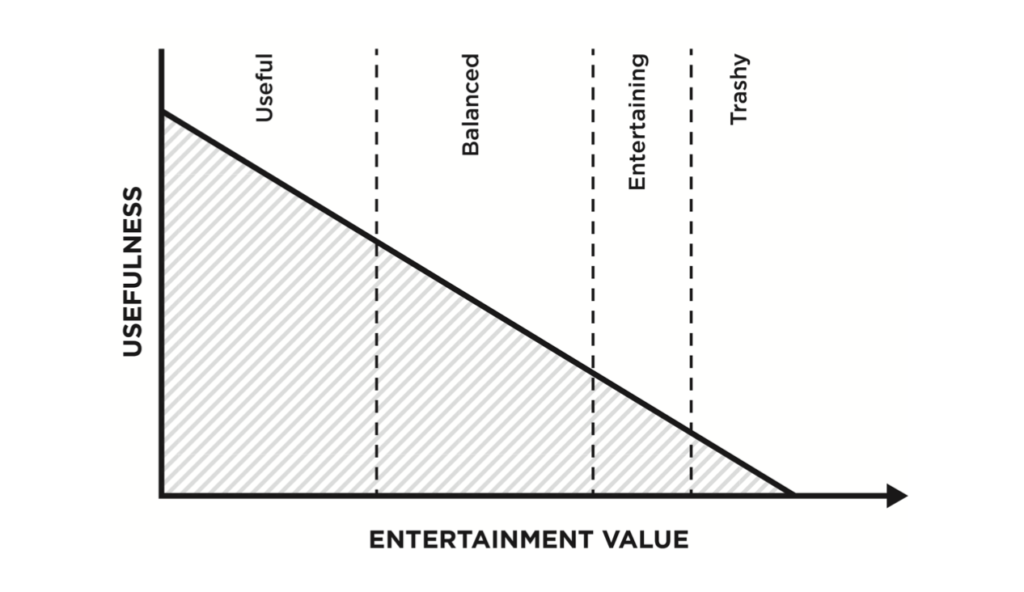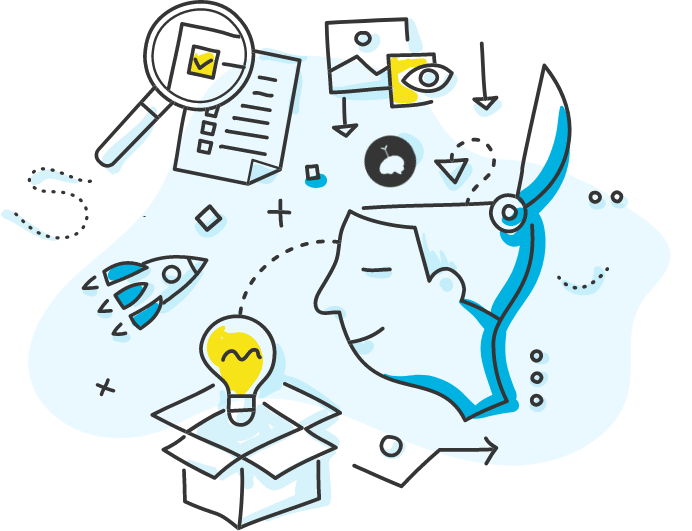Estimated Reading Time:3 minutes, 10s.
Podcast Length28 minutes, 44s (link to play podcast at bottom of post).

The quality and content of the information we consume matters. It influences pretty much every part of who we are, including:
- what we think about,
- how we think,
- what we pay attention to in the world around us,
- what we notice,
- the quality of our decisions,
- how intelligently we work,
- the richness of our personal lives,
- how many ideas we come up with,
- how much we consider other people in our actions and decisions.
Generally speaking (as I write about in Hyperfocus), when it comes to what we consume, practicality does not always equal entertainment.
To illustrate this, we can chop the above chart up into a few slices, which have varying levels of usefulness and entertainment value:

Useful information is typically highly-useful, but not very entertaining. A few examples: books, journal articles, online courses, and academic conversations. Information in this category is actionable, accurate, and typically remains relevant for a long time.
Balanced information is slightly less helpful, but more entertaining, so it’s easier to consume. A few examples: documentaries, TED talks, and popular psychology books.
The final third—which contains both entertaining and trashy information—contains entertaining content that’s still a bit useful (and highly-entertaining), and also information that’s trashier, which we often consume in large doses. Some examples of information in these categories: many YouTube videos, some podcasts, romance novels, late night talk show clips, and our social media feeds.
Every single thing you consume falls into one of these categories. Useful information is usually worth taking in when you have the most energy; balanced information is great for when you have a bit less energy (but still want to feel like you’re accomplishing something); entertaining information is fun for when you want to veg out. Trashy information is probably worth consuming less of—and plus, there are far better ways to recharge.
So what can we do with this knowledge?
On this week’s episode of Becoming Better, Ardyn and I dig into the sorts of things we consume each day—as well as the meaning and enjoyment it all brings. Knowing where on this chart you spend most of your time is critical—as is making an effort to take in more valuable information over time.
There are countless ways you can do this. For example, you can:
- Get things to bid for your attention. See the descriptions of audiobooks, podcasts, and TV shows as pitches for your time and attention. Are they worth the time you’ll put into them?
- Think of a few valuable things to add to what you consume. What’s a skill you haven’t developed in a while? What’s a topic you’ve always been curious about? Could you learn about it instead of scrolling through your social media feeds?
- Notice what you consume on autopilot mode, without thinking. This is usually when we consume the least valuable information.
- Consume what you care about, that few other people do. For example, I love reading journal articles about productivity. While this is admittedly a weird fascination, I find that it gives me an edge—few other people find these journal articles entertaining. As a general rule, it’s worth building upon knowledge and skills that you uniquely care about.
- Veg out intentionally. You’d become a robot if you only consumed useful information. To enjoy vegging out a bit more—like the next time you sit down to watch a bunch of episodes of your favorite Netflix show—do so intentionally. Plan out how many episodes of the show you’ll watch, what you’ll eat when you do, who you’ll invite over to watch, and so on. You won’t just have a better time, you’ll also feel less guilty about it.
As I write about in Hyperfocus, no two pieces of information are created equal. We perceive the world around us through the information we’ve consumed in the past—this is one of the myriad reasons why the state of our attention determines the state of our lives. The strategies above are all great ways to spend your time and attention better—all while increasing the quality of your attention.




